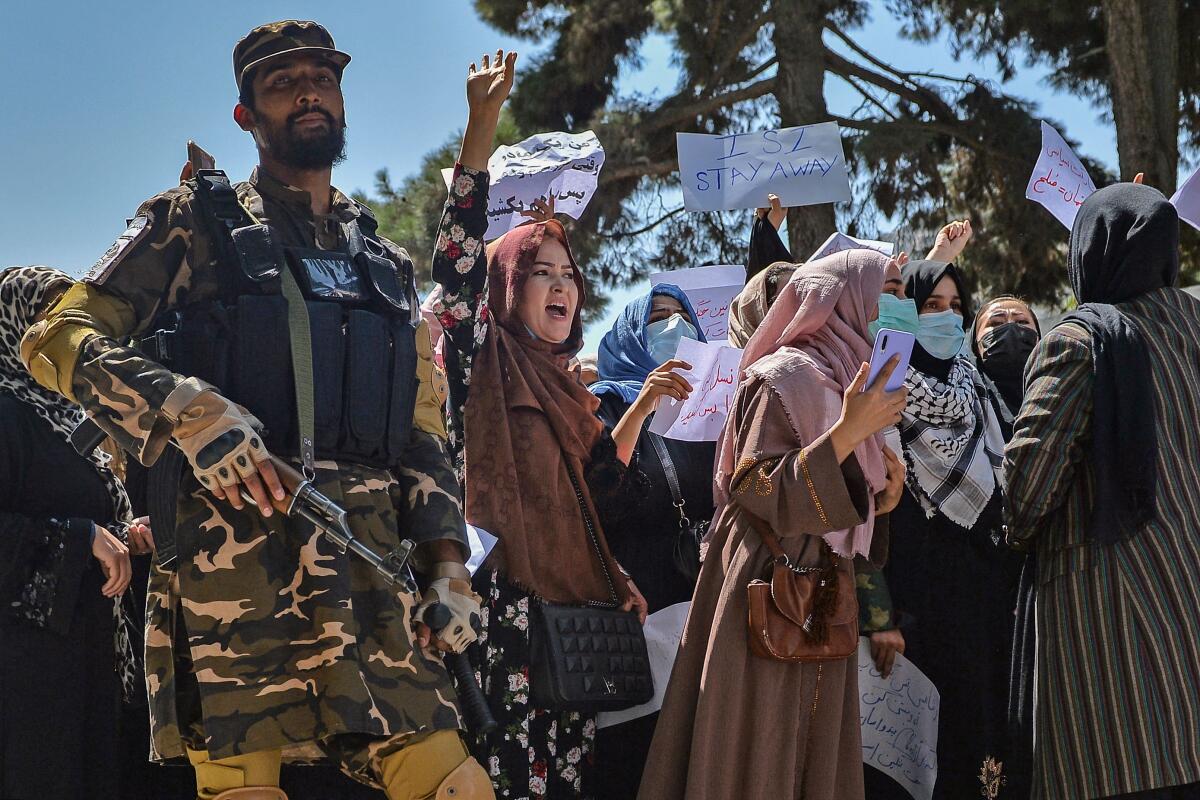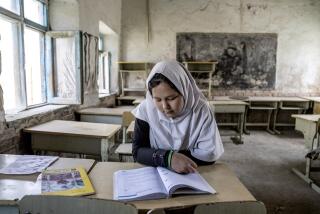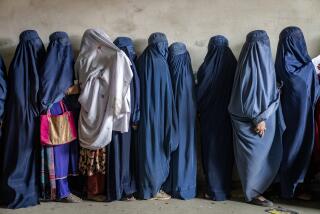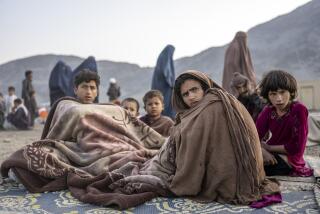Taliban calls protests ‘illegal,’ names caretaker Cabinet dominated by old guard

The Taliban on Tuesday named an all-male caretaker government in Afghanistan dominated by hard-line figures from its old guard, and cracked down on some of the largest street protests since the group seized control of the country last month.
The developments reignited fears that the Taliban will revert to its harsh ways of controlling Afghan life despite promises of moderation.
The interim Cabinet announced by the group is dominated by veteran militants, has no women or members of the previous government and includes few members of ethnic minorities. In addition, a senior spokesman declared that protests such as those on Tuesday in Kabul, the capital, which once again included women calling for their rights to be respected, would not be tolerated.
Calling the demonstrations “illegal,” Taliban spokesman Zabihullah Mujahid warned Afghans against trying to “use the current situation to cause trouble.”
Taken together, the actions signaled that the Taliban movement faces an uphill fight to convince a skeptical world it is prepared to leave behind the core attributes of its last rule a generation ago, marked by the subjugation of women and deadly reprisals against those who dared oppose it. At the same time, the country of 38 million people is stalked by hunger and a deepening economic crisis, lending urgency to the group’s quest for aid and recognition.
Senior Biden administration officials visiting the Persian Gulf emirate of Qatar, which has emerged as a key player in American engagement with the Taliban since the U.S. withdrawal from Afghanistan on Aug. 30, tacitly acknowledged that Western leverage is limited.
Secretary of State Antony J. Blinken told reporters in Doha, Qatar’s capital, that the Taliban had been reminded of the group’s commitment to allow anyone with valid travel documents to leave Afghanistan if they wished.
Blinken, who appeared alongside Defense Secretary Lloyd J. Austin III, said U.S. citizens remaining in Afghanistan, including dual nationals, were believed to number about 100. He said that the State Department is in direct contact with them and that the Taliban had upheld its commitment in the case of a family of four Americans who had safely left Afghanistan using an unspecified overland route.
In Kabul, the newly named interim Taliban government did not suggest any dramatic turnabout in either style or substance.
Mullah Mohammad Hassan Akhund, who heads the group’s top leadership council and served in several Taliban government posts in the ‘90s, was chosen to be the interim prime minister, with Taliban co-founder Mullah Abdul Ghani Baradar as one of his two deputies, Mujahid said at a news conference in the capital.
Sirajuddin Haqqani, head of the Haqqani network, a Taliban offshoot regarded as a terrorist group by Washington, was named interim interior minister. The Defense Ministry was given to Mullah Yaqoob, the eldest son of Mullah Mohammed Omar, the cleric who founded the Taliban, while Amir Khan Muttaqi, a member of the group’s negotiating team in Qatar, would be foreign minister.
Though Mujahid insisted the lineup was temporary, he gave no mention as to when or how it would be finalized.
The State Department, asked about the composition of the caretaker Taliban government, said it was “concerned by the affiliations and track records” of some of the new ministers, and noted the Cabinet was made up exclusively of Taliban and their close associates, and included no women. A department spokesman said the Taliban, which has promised an inclusive government, would be judged on “actions, not words.”
In the three weeks since the Taliban entered Kabul on Aug. 15, its officials have insisted they have learned from their 1996-2001 rule, which was characterized by brutality and condemned by much of the world, and have promised to form a government that would reach out to its onetime adversaries in the U.S.-backed government.
As it stands, however, none of the 33 Cabinet members comes from outside the Taliban — no women and very few ethnic minorities (only three are not Pashtuns, observers said) — violating a condition placed by the international community on any prospective government in Afghanistan for unlocking billions of dollars in desperately needed aid.
Failing to get that assistance is likely to spur an economic meltdown, with the government — which needs aid to cover three-quarters of its expenses — unable to bring in foreign currency and prevent the fall of the afghani against the dollar. Already, food prices are rising, with people forced to queue for hours in front of ATMs to withdraw roughly $200 a week.
The government announcement came one day after the Taliban’s claims that it controlled the Panjshir Valley, where a stubborn knot of resistance had coalesced around onetime Vice President Amrullah Saleh and Ahmad Massoud, son of the famed anti-Taliban guerrilla fighter.
But far from cementing the Taliban’s grip over the country, its assault appeared to inflame those who believe the group has no intention of changing its militant tactics and its oppression of women.
On Tuesday, about 1,000 people flooded the capital’s streets, demanding freedom and the safeguarding of women’s rights. They also called for an end to Pakistani interference in Afghanistan. (Many Afghans blame Pakistan for supporting the Taliban.)
It was among a number of protests that have popped up across the country in recent days, but this was the largest, involving men and women demonstrating together before Taliban gunmen, who at first allowed the march to proceed peacefully but then interceded with violence, beating protesters and firing automatic weapons into the air to disperse the crowds.
Some of those bullets struck a nearby high-end hotel, shattering windows. One journalist with Tolo TV, an Afghan broadcaster, was detained for a few hours.
Demonstrators said they were undeterred and would continue with protests.
“We are not defending our right for a job or a position we will work in, we are defending the blood of our youth, we are defending our country, our land,” said one woman in a video from the protest posted to social media.
Mujahid, the Taliban spokesman, said at the news conference that the protest had been incited by unspecified people from abroad. In response to a question on the gunfire, he said Taliban fighters were not trained to deal with demonstrations — an assertion reminiscent of a Taliban declaration last month that women should stay home until the group’s fighters were better instructed in how to interact respectfully with them.
In Doha, Blinken met with an all-female robotics team, some of whose members managed to flee after Kabul fell to the insurgents.
“You are famous around the world, a source of inspiration around the world,” he told a dozen or so girls who gathered in a community center. They nodded as he spoke, their eyes wide above their COVID-19 masks and below their head scarves.
Businesswoman Roya Mahboob founded the group in 2017, and it went on to compete internationally, seen as an example of how far women in Afghanistan have come in education and opportunity. She spoke for the girls, most of them in their teens, to express appreciation to Blinken for U.S. help in the evacuations, but also fear for those who remained.
The group and its supporters once had hope that Afghanistan would become a country with strong technological skills, she said. Now, she said, everyone is terrified.
“There is lots of uncertainty,” Mahboob said, looking directly at Blinken. “What is your plan, what is your U.S. government going to do for the ... futures of children and women in Afghanistan?”
Blinken didn’t have many answers.
“There’s so much change happening,” he said. “I can’t tell you where everything is going to land.”
Times staff writers Bulos and Wilkinson reported from Kabul and Doha, respectively. Staff writer Laura King in Washington contributed to this report.
More to Read
Start your day right
Sign up for Essential California for news, features and recommendations from the L.A. Times and beyond in your inbox six days a week.
You may occasionally receive promotional content from the Los Angeles Times.








